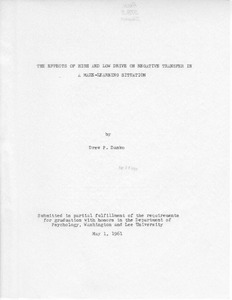| dc.rights.license | In Copyright | en_US |
| dc.creator | Danko, Drew P. | |
| dc.date.accessioned | 2023-10-20T17:40:11Z | |
| dc.date.available | 2023-10-20T17:40:11Z | |
| dc.date.created | 1961 | |
| dc.identifier | WLURG038_Danko_thesis_1961 | |
| dc.identifier.uri | https://dspace.wlu.edu/handle/11021/36343 | |
| dc.description.abstract | The question of the role of motivation in learning is of paramount importance in contemporary learning theories. Motivational behaviorists feel that there is at least one set of emprical relationships in addition to those covered by a model stimulus - response - reinforcemet. These relationships are called ''drives" (Lawson, p323-324) Drive can be viewed as the relationship between procedures --such as deprivation -- to behavior changes -- such as increased response strength -- under conditions where learning could not be invoked as the direct or indirect determinant of such changes (Lawson, p361-362). As the importance of drive is obvious, so is the phenomenon of transfer. This concept is regarded as one of the basic processes by which the manifestly complex behavior of humans develops from simple habit formation. Numerous studies have been attempted to determine the relationship(s) between drive and positive transfer in which the learning of Habit A can facilitate the learning of Habit B (Lawson,p222-227). However, a review of the literature from 1939 through 1960 indicated that no study had been attempted to determine the effects of drive level on negative transfer. It was decided that this was a suitable problem for an experiment. [From Introduction] | en_US |
| dc.format.extent | 30 pages | en_US |
| dc.language.iso | en_US | en_US |
| dc.rights | This material is made available for use in research, teaching, and private study, pursuant to U.S. Copyright law. The user assumes full responsibility for any use of the materials, including but not limited to, infringement of copyright and publication rights of reproduced materials. Any materials used should be fully credited with the source. | en_US |
| dc.rights.uri | http://rightsstatements.org/vocab/InC/1.0/ | en_US |
| dc.subject.other | Washington and Lee University -- Honors in Psychology | en_US |
| dc.title | Effects of High and Low Drive on Negative Transfer in a Maze-Learning Situation | en_US |
| dc.type | Text | en_US |
| dcterms.isPartOf | WLURG038 - Student Papers | en_US |
| dc.rights.holder | Danko, Drew P. | en_US |
| dc.subject.fast | Behaviorism (Psychology) | en_US |
| dc.subject.fast | Learning, Psychology of | en_US |
| dc.subject.fast | Conditioned response | en_US |
| local.department | Psychology | en_US |
